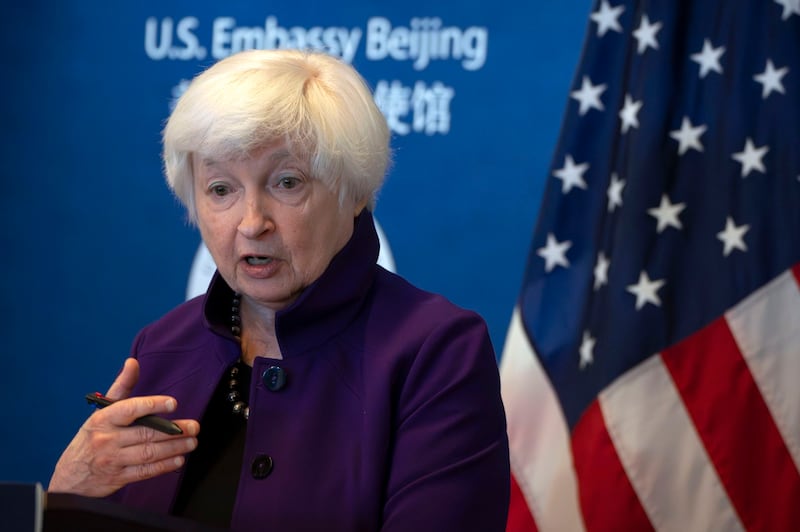Beijing has accused the U.S. of trying to block its development, claiming that the Biden administration is pursuing “technology hegemony.” It also urged Washington to “immediately revoke its erroneous decision.”
“China strongly opposes and expresses firm dissatisfaction with the U.S.’s insistence on implementing investment restrictions against China,” said China’s Ministry of Foreign Affairs in a written statement Thursday.
The ministry accused the U.S. of trying to deprive China of “its development rights” in a move that constituted “naked economic coercion and technological bullying.
“This action by the U.S. seriously violates the principles of market economy and fair competition, disrupts the international economic and trade order, disturbs the stability of global industrial and supply chains, and severely damages the interests of businesses in China, the U.S. and around the world. Its essence is anti-globalization and decoupling from China.”
The strong reaction came a day after U.S. President Joe Biden issued an executive order that regulates American investments in China's microchip, quantum computing and artificial intelligence industries.
Biden administration officials, speaking on the condition of anonymity, said the order will limit China’s access to technologies “critical to the next generation of military innovation.”
“China opposes the U.S.’s overuse of national security to politicize and weaponize trade, scientific and technological issues and deliberately making obstacles to normal economic and trade exchanges and technological cooperation,” Liu Pengyu, spokesperson for China’s embassy in Washington, told RFA.
“The U.S. side has repeatedly expressed its non-intention to ‘decouple’ with China, but what it actually did is repeatedly ‘decoupling and severing supply chains’ from China,” he said.

In Beijing last month, U.S. Treasury Secretary Janet Yellen said the U.S. doesn't want "decoupling" but is pursuing "de-risking."
Beijing is likely to see such words as little more than semantics, but it is in an unfamiliar place economically.
It’s a particularly sensitive time, with official data on Wednesday showing that China’sconsumer prices fell year-on-year in July for the first time in two years, amid wide concern about deflationary pressure on what was previously seen as a “miracle economy.”
"I don't think the U.S. Treasury or the [Biden] administration planned it this way, but this is spectacularly bad timing for China," said Eswar Prasad, a professor in international trade at Cornell University, in an interview with CNBC.
“Confidence is falling, growth is stalling, China seems to be sliding into a downward spiral with deflation, low growth and lack of confidence all feeding on each other,” Prasad added.
‘Bad folks’
At a reelection fundraiser in Utah on Thursday, Biden said, "We have China to deal with," calling it "a ticking time bomb in many cases," the Associated Press reported.
“They’ve got some problems,” Biden said. “And that’s not good because when bad folks have problems, they do bad things.”
Biden is known for his unexpected pokes at Beijing, with some commentators referring to them as “gaffes.”
In June, just two days after U.S. Secretary of State Antony Blinken wrapped a visit to Beijing, Biden elicited a flurry of angry responses from China by calling Xi Xinping a dictator. Biden declined to walk the remark back.
At the fundraiser on Thursday, Biden said that China was in “trouble” due to turgid growth and the “highest unemployment rate going.” He also blasted Xi’s signature Belt and Road Initiative as the “debt and noose,” because of the high levels of lending to developing economies associated with the global investment program.
Investing in China
Beijing had previously heralded this year as " The Year of Investing in China," but foreign investors have failed to materialize as the administration shows every sign of being determined to make it harder to do business in China, not easier.
Following the implementation of a new counter-espionage law last month, the U.S. State Department advised Americans to reconsider travel to China due to "arbitrary enforcement of local law," "exit bans" and "wrongful detentions."
Meanwhile, a long anticipated bounce-back in consumer demand after the end of COVID-19 lockdowns has so far been a damp squib, as China faces what is frequently referred to as the "specter of deflation" with households and businesses paying down debts rather than exuberantly borrowing and spending.
It’s likely that China’s economic squeeze is making it reluctant to react to the U.S. technology restrictions materially.
According to the latest Chinese rules, which took effect on August 1, exporters of gallium and germanium, rare metals used in computer chips and solar cells, need to obtain government licenses.
China has so far made no further retaliatory moves.
Edited by Mike Firn and Taejun Kang.
